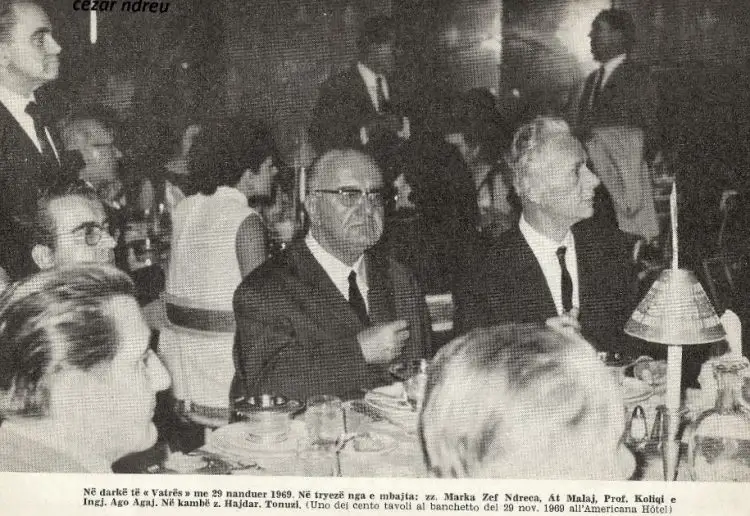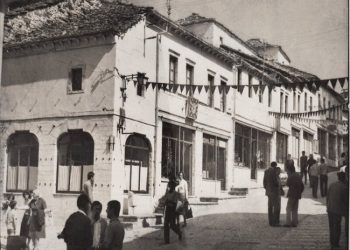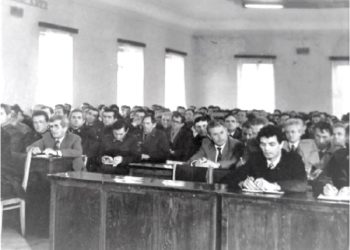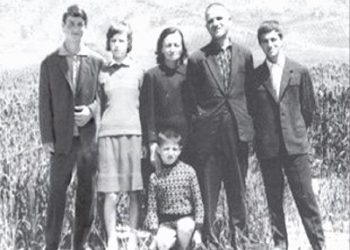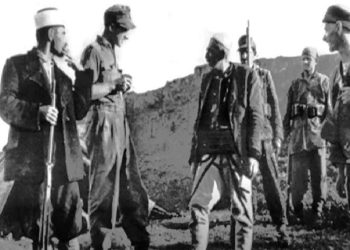By Dalip Greca
-SHOCKING STORY: THE SWAMP OF DEATH, WHERE 135 PEOPLE LOST THEIR LIVES CRUELLY-
Memorie.al / In prison, Reshat Agaj escorted his cellmates who were sentenced to death and in his diary, he details how Reshat Stërmasi, before being shot, saw his tragic end in a dream. Vasil Llazar experienced the same thing. Before the shooting, they told their dreams to priest Irine Banushi, who tried to dispel their premonitions. Agaj’s diary brings the picture of pain and the confrontation with the severity of the dictatorship in those years. Another picture of violence comes from prison camps, where prisoners were exploited and treated like medieval slaves. He says that on May 14, 1948, they announced that they would send them to what was called the death swamp, in Maliq in Korça. Not a few, but 400 prisoners, started early in the morning towards the swamp of death.
In each truck were placed 15-20 prisoners, along with their booty, and all were tied to a long chain that tied their hands around. Reshati writes that it was a journey of slaves, with indescribable suffering and pain, that with every shake of the car, they also shook. As a result, their hands were pinched and scarred by the thick chains. When they got there late in the afternoon, they found other prisoners, from the prisons of Durrës and Elbasan, a total of 2000 prisoners, sheltered in six long wooden barracks, covered with sheet metal and old raincoats, and inside there were two rows of sleeping places, boarded up.
It was there that he spent six terrible months, which he could not forget until he closed his eyes in Kenosha and was buried in Detroit. Reshat testifies that during the time he worked there, he saw death with his own eyes. There, 135 Albanian prisoners died from torture, diseases and super-human suffering. They were all buried on the shore in front of the Vloçisht village mosque, nearby. Eight people were brutally killed by the police, even though they dared to make a small protest. Or, even if the police wanted to have fun, to increase the terror of others, with inhumane and scary acts. Reshat testifies: “Before my eyes, a tyrant was beaten to death, who also had his son imprisoned, who was covered, as if he were a dirty dog, on the road leading to the canal, there in the place of work, in the terrible mud of Maliqi”.
Life in the prison camp was brutal. The wake-up call was at four o’clock in the morning and within an hour, they had to get ready and line up. And after they had received that teaspoon and the bread that was given to them in the morning, they set out to face the mud and sticks of the policemen. At the beginning of the channel was the terrible mud of Maliq full of leeches, which climbed through the bare feet and drank what little blood they had left. Each prisoner had to fill the daily quota, which was three cubic meters of excavated earth, to be transported to the side of the canal in handcarts. This was a truly inhuman norm, considering the physical weakness; the low resistance of their bodies, the miserable food, the mud compacted from centuries under water. Then the length of the working day, which exceeded 12 hours, etc.
He remembers that there were prisoners who ate the ration of 700 grams of bread, immediately in the morning, as soon as they received it in their hands and spent the day with lunch and dinner without bread. There were people who, for a pack of cigarettes, would sell half their bread and keep their bellies empty, for those desolate cigarettes and remain on the streets, pushing the policemen with sticks behind their backs, if not worse. Let’s browse the diary: “Here I have seen with my own eyes, that hunger leads a person to become a real animal. He, who does not know hunger, does not know life at all. The suffering here reached the height of human endurance, and many people, who were a little past their age, were so swollen in their legs and faces that they became unrecognizable and barely recognizable.
The swelling, the doctors said, came from a lack of vitamins. In the camp we had about five doctors, who kept the infirmary running. They were also imprisoned with different sentences. When the police decided that someone should go to work, no matter how many the doctors said that he was not able to, because he was sick, he would definitely go and, if he died on the way, no one would worry about him.
The most terrible policeman of this camp was a prostitute, settled with his family in Lushnja. He was a real tiger, heartless and merciless. Another policeman, who almost killed me on the spot, was Ali Gana, from Tërbaçi in Vlora, who had previously had his family in Brusnje, where my cousins lived, and had an inexplicable hatred against the whole family Agaj.
One rainy day, when the whistle blew to stop work, I was only a few moments late to get in line, because I was wiping off the mud that had stuck to my body. Ali came behind me and punched me so hard in the nose that my blood flowed.
If I had uttered the slightest sound, or any word, or, if I had made any complaining gesture, he would have had his hand on the collar ready to take it off me. Fortunately, I endured this punch with the patience of a saint and did not move from my place.”
Then Reshati tells another case, when he wanted to fill the gourd with canal water, he was the last of the column.
Then the policeman goes to him, and pushed him hard; he threw him headfirst into the bottom of the canal and his head sank into the big mud, almost taking his breath away. At this time, a policeman who was on the other side, that the column of prisoners was accompanied on both sides of the canal by two long lines of policemen armed to the teeth, shouted to the policeman who pushed him, saying: – Do you fall to the dog, shall I take the dog’s soul?
He heard the words clearly and waited for an hour and a second for the bullet to whistle through his body, as had happened to many others who had suffered it. Another policeman called to him: – Run up, run up! And he dazed and out of his mind as he was, sprang up and began to run until he overtook the column, which was a few paces before him, leaving behind his bag and the few rags he carried with him, such as his dish-bowl and others.
He writes in his diary that; so terrible was the terror of that day, that when he looked at himself in the mirror on the following Sunday, he noticed that, from the middle of his forehead to the back of his head, a white line had formed in his hair.
His hair had turned white from the horror he experienced. Thus past six months of horror. In the diary they find extreme cases of violence, they find described the miserable picture of hunger, where prisoners with eyes darkened by not eating, closed their eyes and collected the skins of potatoes that were thrown into the sewage by the kitchen staff, which they ate greedily . Another horror and curse for them were the lice, which had covered not only the barracks, but also the large field between the barracks. Beatings and violence were common. The ignorance of the police was taking innocent lives. During a search, Reshat was found a book in English, which Viktor Dosti had given him.
Although he told the policeman that the book was actually in English, he was talking about English. But the policeman didn’t know what English was and hit him non-stop just because the book was in English.
On November 14, 1948, they were returned to Tirana prison, tired and exhausted.
May 1949, release from prison!
After the fall of Koçi Xoxes and the Yugoslav influence, the government made many releases from prison on May 1, 1949. From the old prison of Tirana, where Reshat was locked up, that day a total of 250 people were released.
Several Security officers stood at the prison gate and gave them each a ticket for transportation to the places where each of them would go to their families. Reshat shot number 199 and waited until it was his turn. With the spoils loaded like Victor Hugo’s Jean Val Jean, as he describes in the novel “Les Miserables”, he went out dressed in his old personal clothes.
Together with him were Idriz Ruka, Kajtaz Abedini, who accused him in court, when they arrested him and Xhevit Mehilli from Dukati. They went and took a place in a hotel in Tirana to leave the next day for Vlora. The next day he went to Vlora, he was greeted by Ejup Zotaj, who had become the director of the Vlora Hospital, because his wife was Hysni Kapo’s cousin. He gave him courage by saying that; they would probably hire him again, as a stenographer.
A gloomy picture of misery
The next day he went to Drenie to be with his family. Pertefi, the brother was imprisoned and nothing more was known. Refua, his mother, sisters Zineti, Manua and Elizabeta, his wife Drita and sister-in-law Erveheja, with her two children Fillanda and Astriti, who was born in 1946, when he was in prison, welcomed him with open arms. He found them all safe and sound, but the poor people had no bread, because they had run out of corn.
From all the cattle they had before, they had 10-12 sheep and a cow of the “Shkodra” breed, which was very dear to the children because it kept them alive with its milk.
The dog ‘Gumo’, who was barely chained when Reshat was free, was now sick and had fallen to give his last breath.
Sometimes he would stand up and let go of his voice for a moment, but again he would fall on his bed, completely a skeleton.
The next day, Gumo was lying on the ground and all the children around him were crying. The deserted ‘Gumo’ died because he had nothing to eat, and the children ate oven-roasted cabbage, with a handful of flour underneath and a handful of flour on top, to give it the appearance of a pie, and a handful of salt. This was the family’s only food. Mother Refoja used to make a small cake for Reshat, which she gave him to eat separately.
And they themselves surrounded a wooden mahogany and ate all at once, around the pan with cabbage and corn noodles. At a meal, when he was eating, little Astrit, the son of Pertef, who was three years old, came up to him, removing his creeper from the wall, and asked him:
– Cheço, what are you doing, do you eat bread? Reshat writes with sadness: “I will never forget those words as long as I live. That poor baby, malnourished and not worse, watched that I was eating their blood, that they all ate cabbage. The bread stuck in my throat immediately and I refused to eat any more, except for them and I told my mother that I wanted to eat all of us together, you and me. Memorie.al




